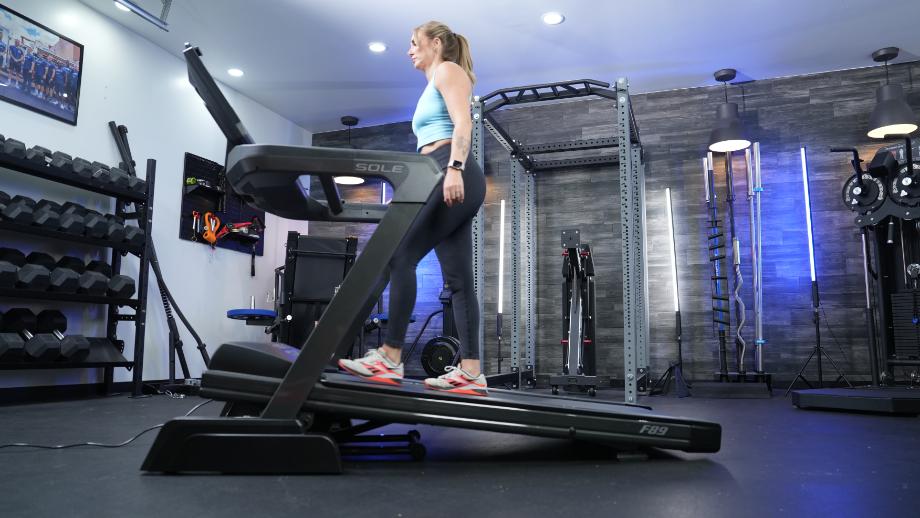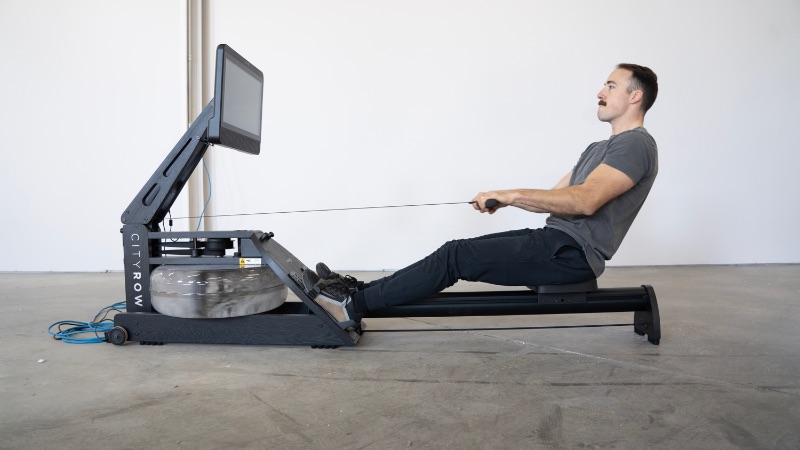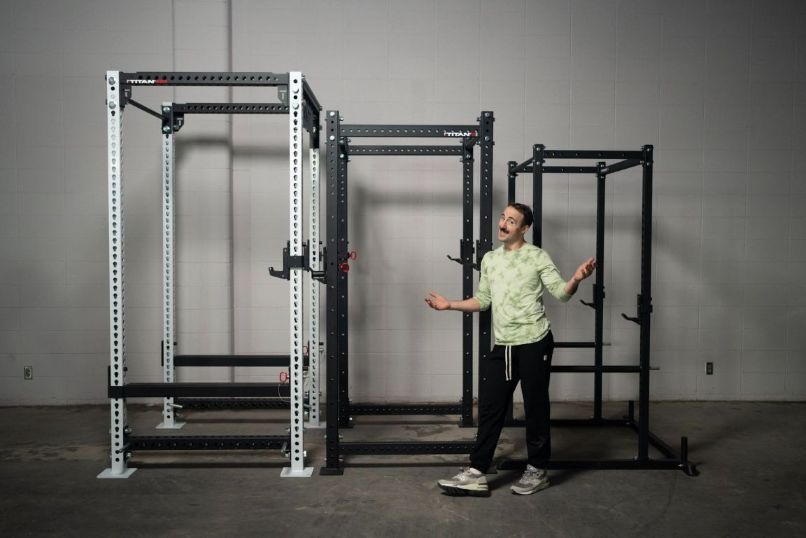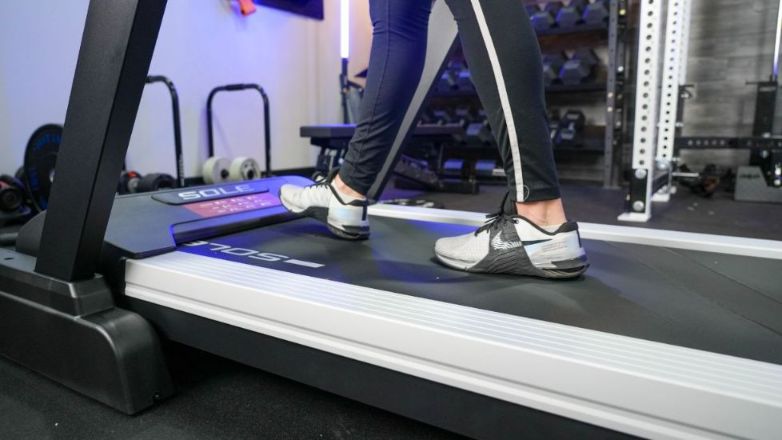Are you ready to elevate your treadmill routine—literally? Treadmill hill workouts may be the secret weapon you’ve been missing to transform mundane cardio sessions into exhilarating and effective fitness challenges. With just a few adjustments to the incline settings, you can intensify your workouts, burn more calories, build greater endurance, and keep boredom at bay.
RELATED: Incline Treadmill Workouts
Whether you need to shake up a stagnant routine or unlock a new level of lower-body strength and stamina, hill training can make every step count more. As a certified personal trainer (CPT) and longtime rugby player, I’ve put together this guide to help you learn how and why hill repeats and incline running workouts belong in your program.
So, tighten the laces on your favorite treadmill running shoes and prepare to take your treadmill sessions to new heights.
What Is a Treadmill Hill Workout?
A treadmill hill workout involves running or walking on a treadmill with an incline to simulate the experience of hill running. This type of workout can range from gentle slopes to steep inclines, offering varying intensity levels to suit different fitness levels.
Hill workouts are known for challenging cardiovascular endurance, building lower-body strength, and enhancing overall fitness. If you’re used to an easy jog on a flat surface, this can be an eye-opening experience that’ll show you the impact of just changing the percentage of the incline level a few notches.
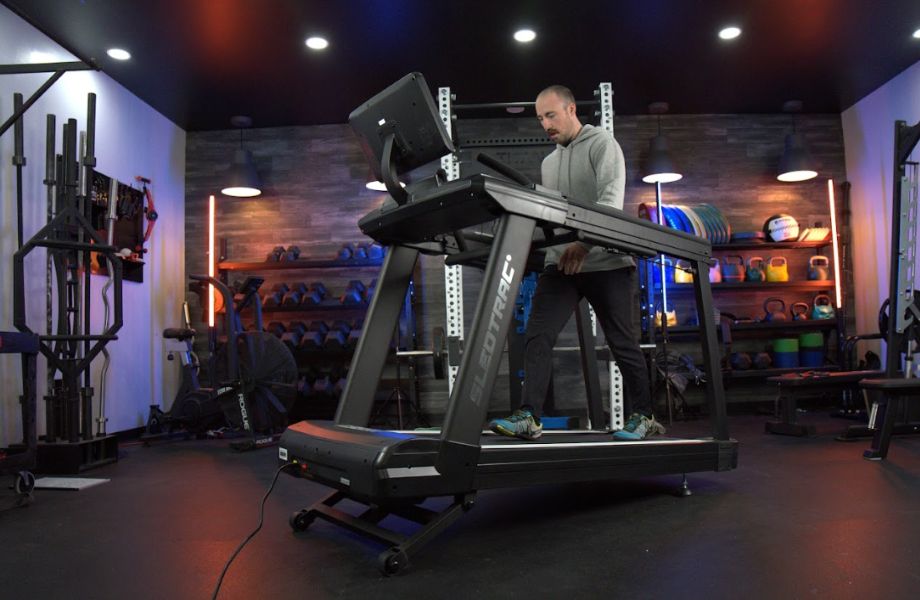
RELATED: Stamina Vs Endurance
Sample Treadmill Hill Training Plans
Tailoring your treadmill hill workouts to your fitness level and goals ensures you’ll get the most out of your sessions. Here are sample plans for beginners, intermediates, and advanced athletes:
Beginner Hill Intervals
The goal of this workout is to build foundational strength and endurance via an interval training method.
RELATED: Treadmill Interval Training Workouts
Warm-Up: 5 minutes at 3.5 mph, 0% incline
The Workout:
- 1 minute at 3.5 mph, 5% incline
- 2 minutes at 3.5 mph, 0% incline
- Repeat the above interval 6 times (18 minutes total)
Cool-Down: 5 minutes at 3.0 mph, 0% incline
Total duration: 28 minutes
Intermediate Fat-Burning Hill Workout
When you’re ready to take things up a notch, this intermediate fat-burning workout is seven minutes longer and features more variety in terms of speed and incline settings.
Warm-up: 5 minutes at 4.0 mph, 0% incline
The Workout:
- 2 minutes at 4.5 mph, 4% incline
- 1 minute at 4.5 mph, 6% incline
- 2 minutes at 4.0 mph, 2% incline
- Repeat the above interval 5 times (25 minutes total)
Cool-down: 5 minutes at 3.5 mph, 0% incline
Total duration: 35 minutes
Advanced Strength Building Hill Workout
Suitable for more experienced athletes, this treadmill hill workout helps enhance leg strength by significantly ramping up the incline level. Plus, this advanced-level session lasts nearly 40 minutes, which will challenge your muscular endurance.
Warm-up: 5 minutes at 4.0 mph, 0% incline
The Workout:
- 3 minutes at 5.0 mph, 8% incline
- 2 minutes at 4.0 mph, 10% incline
- 2 minutes at 3.5 mph, 12% incline
- Repeat the above interval 4 times (28 minutes total)
Cool-down: 5 minutes at 3.5 mph, 0% incline
Total Duration: 38 minutes
Treadmill Hill Workouts Vs Other Types of Treadmill Workouts
Different types of treadmill workouts offer unique benefits. Here’s how hill workouts compare to other forms of treadmill training:
| Workout Type | Focus | Benefits | Ideal For |
| Treadmill Hill Workouts | Cardiovascular endurance, muscle strength, calorie burn | Engages lower-body muscles, improves running form, reduces joint impact | Building lower-body strength and endurance |
| Flat Treadmill Running | Cardiovascular endurance, speed | Provides a consistent running surface, improves aerobic capacity | Runners training for races or maintaining steady-state cardio |
| Treadmill Interval Training | High-intensity intervals, speed, and conditioning | Burns calories, improves speed and anaerobic fitness | Individuals who want to enhance their speed and overall cardiovascular fitness |
| Walking Workouts | Low-intensity cardio, fat-burning | Gentler on joints and suitable for beginners and recovery | Beginners, individuals with joint issues, and those looking for low-impact exercise |
RELATED: 6 HIIT Treadmill Workouts
Benefits Of Treadmill Hill Workouts
Engaging in treadmill hill workouts provides many benefits that can significantly boost your fitness journey. Here are some key advantages:
Increases Calorie Burn
Running or walking on an incline significantly increases the calorie burn compared to flat surfaces because your body must work harder to overcome gravity, increasing energy expenditure. According to a 2015 study1, walking at a 5% incline can burn up to 50% more calories than walking on a flat surface, making it an efficient way to help lose weight and improve your fitness level.
Can Enhance Your Cardiovascular Fitness
Hill workouts provide an excellent mental and physical challenge, as the increased demand for oxygen during incline treadmill training strengthens the cardiovascular system, enhancing your overall endurance. This type of workout also helps improve VO2 max2, a key indicator of aerobic fitness.
Can Help Build Lower-Body Strength and Muscle
Treadmill workouts may not deliver the same muscle-building results as strength training but can still engage multiple muscle groups, particularly in your lower body. Whether you’re incline walking or running, your glutes, hamstrings, calves, and quadriceps are all activated more intensely compared to flat-surface workouts, which can lead to improved muscle tone, strength, and endurance.
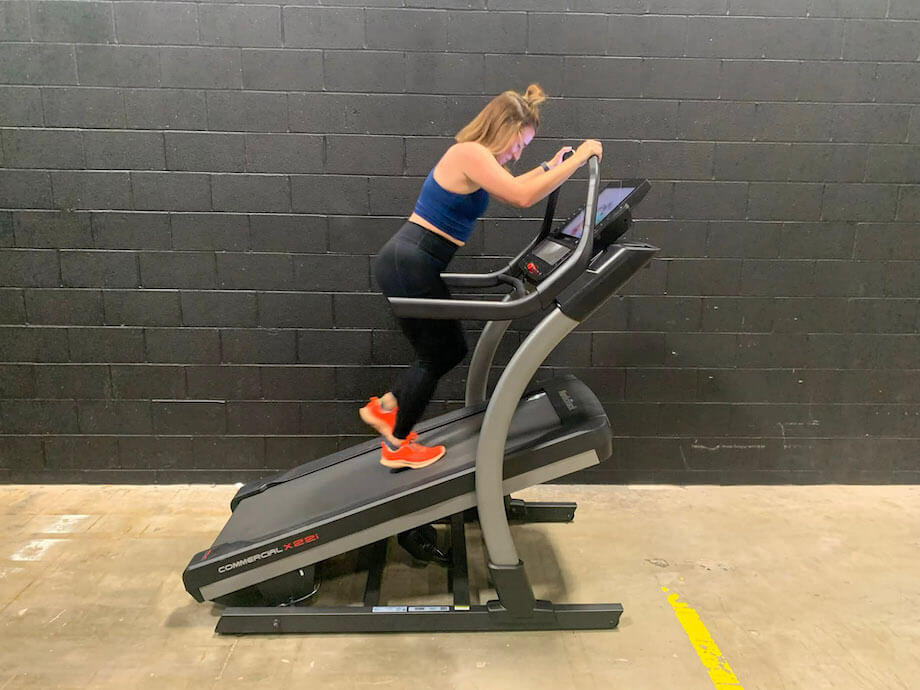
Additionally, your core muscles must remain engaged to maintain balance and stability on the incline.
RELATED: Strength Training for Runners
Can Help Improve Running Form and Efficiency
Running on an incline encourages proper running mechanics. The natural inclination to lean slightly forward and drive the knees higher can translate to better running form on flat surfaces. This improved form can lead to more efficient running3, reducing the risk of injuries and improving overall performance.
RELATED: Good Running Form for Beginners
Reduces Impact On Your Joints
Walking or running uphill can be easier on your joints than running on flat or downhill surfaces. The incline reduces the impact forces on your knees and hips, making it suitable for individuals with joint concerns or those recovering from injury.
7 Tips for Effective Treadmill Hill Workouts
Getting into treadmill hill workouts can be a smooth transition with the right approach. Here are seven key points to consider before you embark on your upward journey.
1. Choose the Right Treadmill
When selecting the best treadmill, look for one with a wide range of incline settings, ideally from 0% to 15% or higher. This allows for gradual progression and customization of workouts. Ensure the treadmill has a sturdy build, good cushioning, and a reliable motor to handle the increased demands of incline workouts.
2. Complete a Proper Warm-Up
Warming up is crucial to prepare your muscles and joints for the workout ahead. Include dynamic stretches like leg swings, high knees, and butt kicks to activate the muscles you’ll be using during the hill workout. Then, spend a few minutes walking on a flat surface before building speed to reach a moderate jogging pace.
RELATED: 3 Treadmill Warm-Up Ideas
3. Set the Treadmill Incline Correctly
Begin with a low incline, especially if you’re new to hill workouts. An incline of 1% to 2% is a good starting point to mimic outdoor running conditions and gradually increase to higher levels as your fitness improves.

Adjust the incline based on your workout goals and fitness level, aiming for a balance between a challenging but maintainable effort.
RELATED: Best Incline Treadmill
4. Maintain Proper Form
Maintaining proper form is essential to maximize the benefits and prevent injuries. Keep your chest up and shoulders back, and engage your core. Avoid leaning too far forward, which can strain your back. Instead, maintain a slight forward lean from the hips, and keep your strides short and quick.
5. Monitor Your Heart Rate
Using a heart rate monitor can help you stay within your target heart rate zone, ensuring an effective workout without overexertion. Aim for 60% to 80% of your maximum heart rate for a moderate-intensity workout and 80% to 90% for high-intensity intervals.
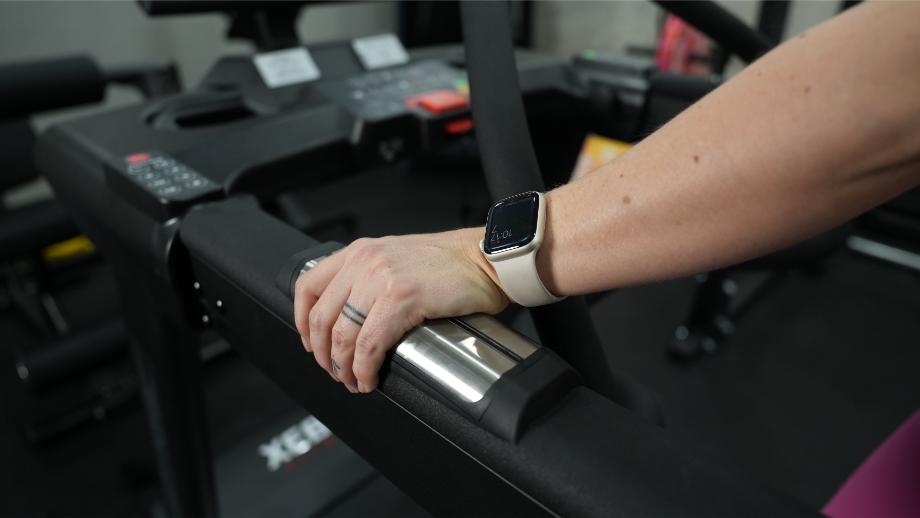
RELATED: Running Heart Rate: What Is Normal?
6. Pay Attention to Your Breathing Technique
Effective breathing can help manage exertion and maintain endurance. Breathe deeply and rhythmically, matching your breath with your stride. Inhale through your nose and exhale through your mouth to ensure a steady oxygen flow.
7. Stay Hydrated
Hydration is crucial during any workout—especially during hill training, which can increase your sweat loss and cause fatigue. Drink water before, during, and after your workout to stay hydrated and maintain performance.
In addition, you can add electrolytes to your water to help replace sodium, magnesium, potassium, and calcium lost through sweat. You could also level up your hydration game with protein water, which can aid muscle recovery.
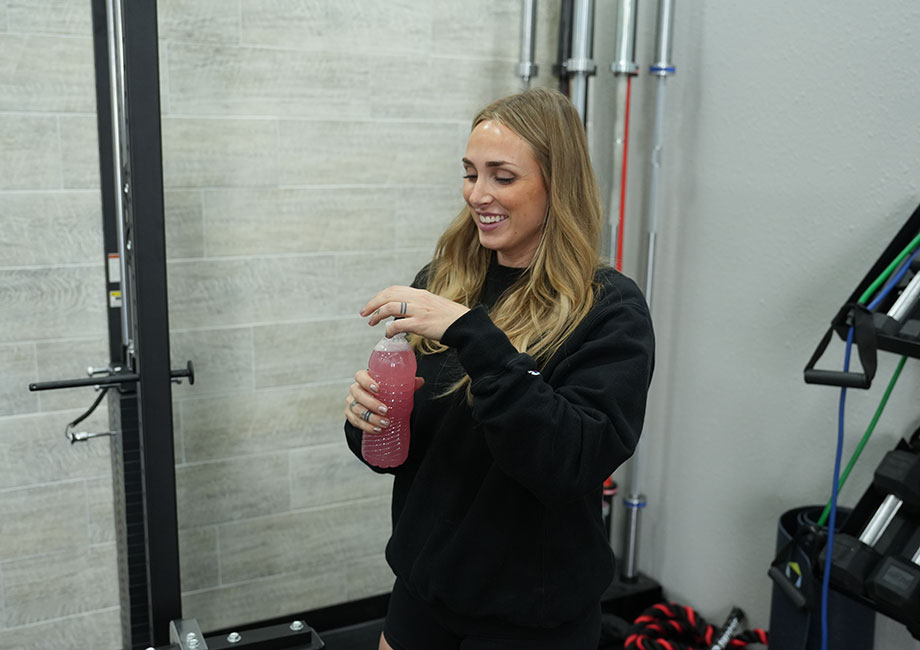
RELATED: What Is Protein Water?
Safety Tips and Precautions
Safety should always be a priority during treadmill hill workouts. Here are some precautions to keep in mind:
Listen to Your Body
Pay attention to your body’s signals during the workout. If you experience pain, dizziness, or shortness of breath, reduce the intensity or take a break. It’s important to challenge yourself, but not at the expense of your health or safety.
Use Proper Footwear
Wearing the right shoes is crucial for treadmill workouts (and training in general). Choose shoes with good arch support, cushioning, and grip to handle the incline and reduce the risk of slipping or discomfort.
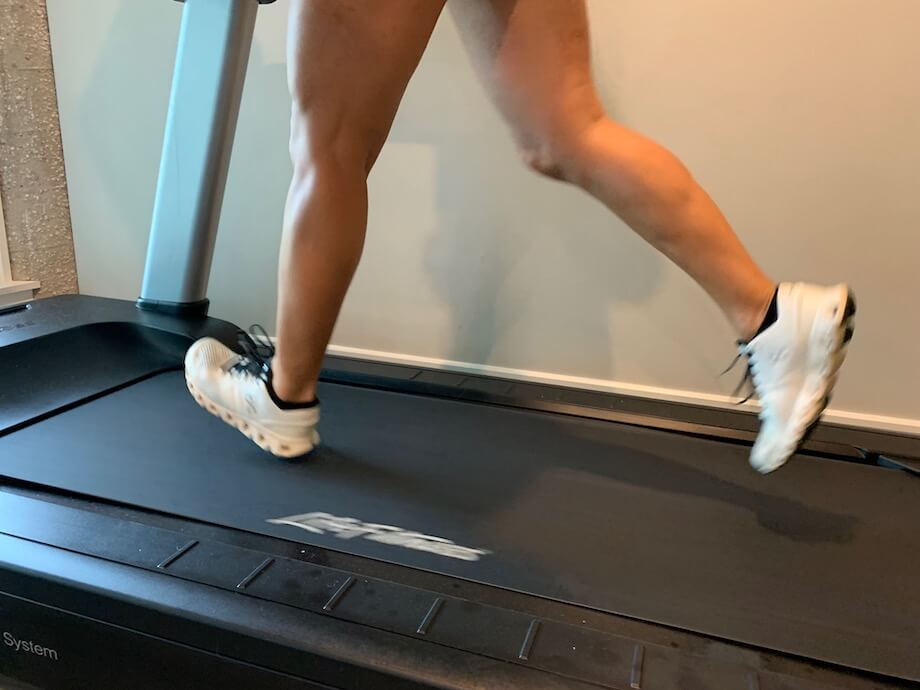
Don’t Skip the Cool Down
After your workout, spend five to 10 minutes walking at a slow pace on a flat surface to cool down. Follow this with static stretches for the calves, hamstrings, quadriceps, and glutes to promote flexibility and reduce muscle soreness.
RELATED: 14 Cool-Down Exercises
Treadmill Hill Workout: Final Thoughts
If your idea of treadmill workouts involves walking at the same slow, steady pace for what may seem like hours, it’s time to ditch that train of thought. Adjusting the incline settings and incorporating intervals can transform your cardio game into a fun, challenging workout. If you’re not afraid of a challenge, get your mind and body ready to climb the proverbial mountain one inclined step at a time.
Treadmill Hill Workout: FAQs
Is walking uphill on a treadmill good for you?
Yes, walking uphill on a treadmill can help enhance cardiovascular health, strengthen lower-body muscles, and contribute to weight loss while being gentler on your joints than running on a flat surface.
What are the benefits of incline treadmill workouts?
Incline treadmill workouts burn more calories, improve cardiovascular health, and strengthen lower body muscles such as the glutes, hamstrings, and calves.
RELATED: 7 Common Treadmill Mistakes
How does a walk on a treadmill compare to a walk outdoors?
Walking on a treadmill offers a controlled environment and consistent surface, while outdoor walking provides varied terrain and environmental engagement.
Why are incline workouts so hard?
Incline workouts are challenging because they require more muscle activation and cardiovascular effort to overcome the increased resistance of walking or running uphill.
How do I program a treadmill for an interval hill workout?
To program a treadmill for interval hill workouts, alternate between periods of high and low incline or flat running, adjusting the speed and incline to match your fitness level and goals.
References
- Silder, A., Besier, T., & Delp, S. L. (2012). Predicting the metabolic cost of incline walking from muscle activity and walking mechanics. Journal of biomechanics, 45(10), 1842–1849. https://doi.org/10.1016/j.jbiomech.2012.03.032
- Lember, L. M., Di Virgilio, T. G., Brown, E. M., & Rodriguez-Sanchez, N. (2021). Hill Runner’s Physiology, Performance and Nutrition: A Descriptive Study. Frontiers in sports and active living, 3, 676212. https://doi.org/10.3389/fspor.2021.676212
- Ferley, D. D., Osborn, R. W., & Vukovich, M. D. (2014). The effects of incline and level-grade high-intensity interval treadmill training on running economy and muscle power in well-trained distance runners. Journal of strength and conditioning research, 28(5), 1298–1309. https://doi.org/10.1519/JSC.0000000000000274


